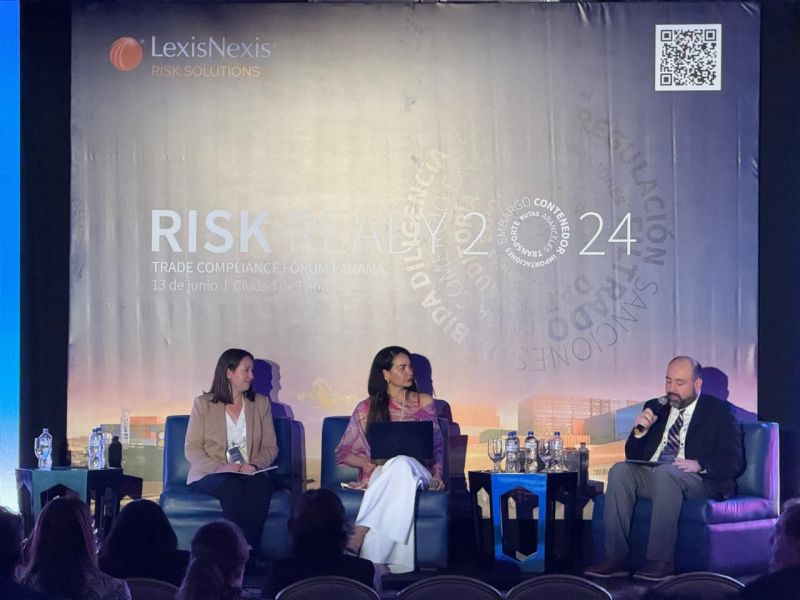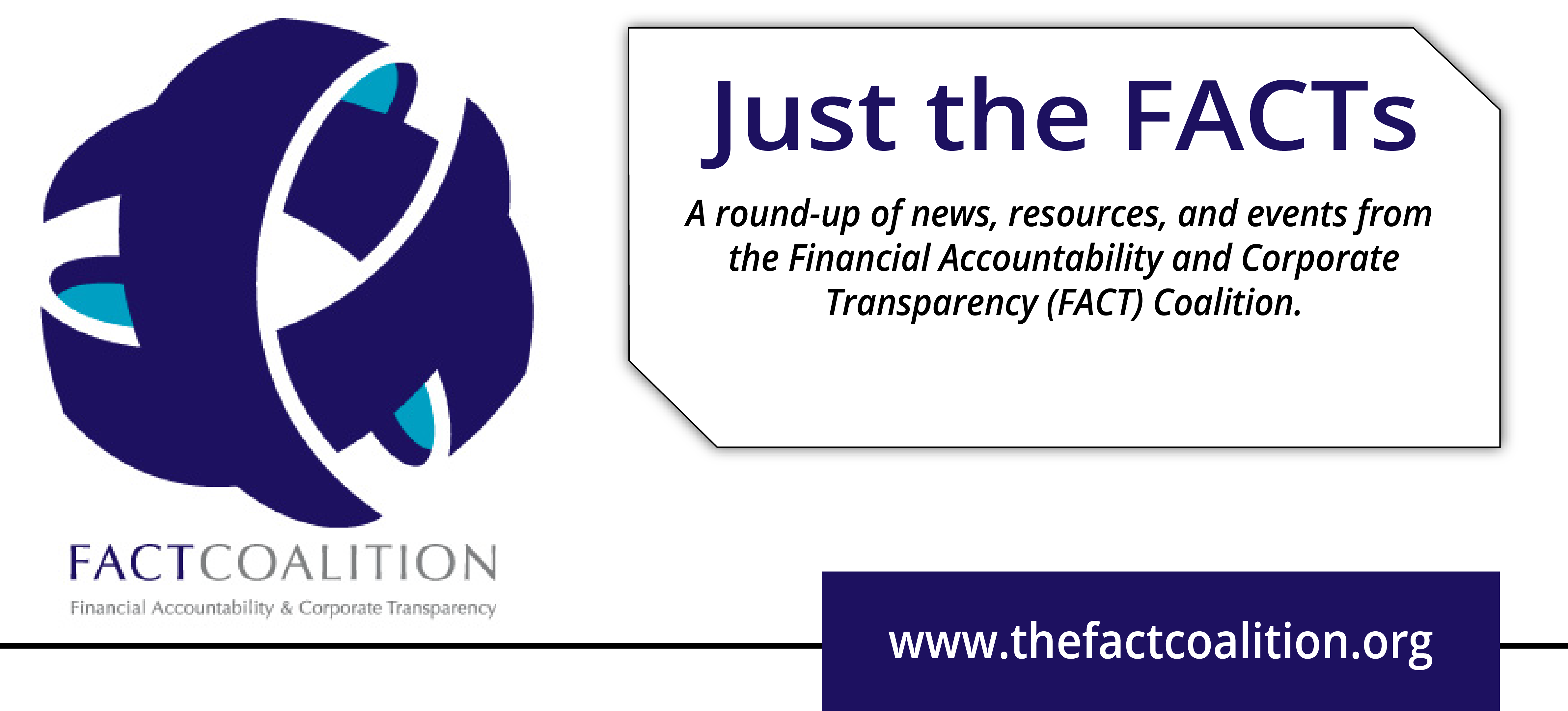“Just the FACTs” is a round-up of news stories and information regarding efforts to combat corrupt financial practices, including offshore tax haven abuses, corporate secrecy, and money laundering through the financial system.
Send feedback or items for future newsletters to Thomas Georges at tgeorges@thefactcoalition.org
Here is the State of Play
FACT Calls on Congress to Repeal Wasteful Tax Break for Big Tech

Early this month, FACT released a new briefing memo on a little known, yet important, provision of the 2017 tax reform package called the Foreign-Derived Intangible Income (FDII) deduction. Though originally conceived as an incentive to bring investment and intellectual property back to the United States, in practice the FDII deduction does exactly the opposite – actively incentivizing companies to offshore U.S. factories, equipment, and jobs, all while costing taxpayers tens of billions annually. While major corporations are fighting to preserve and expand this costly, inefficient provision, Congress must instead use the upcoming expiration of large parts of the 2017 tax law to repeal FDII and make other critical changes to the way the U.S. taxes U.S. multinational corporations.
Though more than 170 Fortune 1000 companies reported receiving a combined $53 billion in tax benefits from FDII between 2018 to 2022, just 20 large corporations – predominantly composed of big tech firms – collected more than 75% of that total. Because of FDII’s flawed design, this enormous tax break does not actually represent increased innovation or spending on research and development, but instead simply above-average, windfall profits from sales to foreign markets.
The same firms that benefit most from FDII are fighting hard to expand the provision. Under current law, the ten year cost of FDII could already reach as much as $224 billion over the next decade, while expanding the measure would prove even more costly.
The FACT-endorsed No Tax Breaks for Outsourcing Act, meanwhile, would both repeal the FDII deduction and eliminate other offshoring incentives introduced by the 2017 tax reform package, raising hundreds of billions over the coming decade.

Supreme Court Issues Landmark Ruling with Widespread Implications for Tax Code
On June 20, the Supreme Court in a 7-2 decision upheld a one-time mandatory repatriation tax on the earnings of foreign corporations, averting what experts have broadly characterized as a potentially massive upheaval of the U.S. tax code.
While the case in question – Moore v. United States – dealt with only a single, relatively obscure tax levied as a part of the 2017 Tax Cuts and Jobs Act (TCJA), the Moores argued for an extremely narrow definition of what types of income are taxable by the federal government under the Sixteenth Amendment. Had the court concurred with this narrow definition, it could have invalidated decades-old provisions that inform how pass-through entities are taxed, among numerous other implications for the tax code. In particular, such a ruling could have potentially invalidated both Subpart F and the Global Intangible Low-Taxed Income (GILTI) regime, which together govern the taxation of U.S. multinationals’ foreign earnings, exposing the U.S. to massive new base erosion and profit shifting risks.
In response to the decision, Chye-Ching Huang, Executive Director of the Tax Law Center at NYU Law noted that “the Supreme Court heeded the warnings of a broad and bipartisan set of tax experts and roundly rejected the Moores’ radical theory that threatened to upend central pillars of the tax system.”
Global Anti-Corruption Champions Gather in Lithuania for International Anti-Corruption Conference
FACT Executive Director Ian Gary represented the Coalition at the International Anti-Corruption Conference (IACC) in Lithuania during a workshop titled “Greed and Corruption: A Disease Accelerating the Global Environmental Catastrophe.” Gary’s session explored the nexus between transnational corruption, environmental crimes, and other forms of serious organized crime.
As a premiere destination for proceeds of environmental crimes committed in Latin America and around the globe, the U.S. has a critical role to play in addressing this issue. FACT is working with its members and allies to change U.S. policies and practices to better address illicit financial flows, including specific initiatives targeting the proceeds of nature crimes like illegal logging and mining.

FACT member organizations and allies also held a number of workshops on diverse topics in anti-corruption. On June 21, Transparency International U.S. hosted a workshop on new multilateral and country-level efforts to crack down on foreign bribery, both on the so-called “supply side” and the less often enforced “demand side.” Transparency International U.S. was a leading proponent of the recently enacted Foreign Extortion Prevention Act (FEPA), which for the first time criminalized the demand side of foreign bribery, authorizing the Department of Justice to pursue cases against foreign officials that request or receive bribes from U.S. companies or individuals.
Earlier in the week, the FACT-member Anti-Corruption Data Collective (ACDC) led a workshop titled “New Frontiers in Using Leaked Data for Anti-Corruption Research,” which featured inputs from journalists, whistleblower protection experts, and other civil society actors. Leaked data, such as the information that comprised the Pandora Papers, Cyprus Confidential, and Panama Papers, has led to transformational changes in the public’s perception of financial crime and international corruption. ACDC’s workshop examined both leaked data’s potential, as well as associated challenges and ethical questions in the use of such data in anti-corruption research.
Latest From FACT

In Brief: About FACT’s Work on Environmental Crime and Illicit Finance
Read a new summary describing FACT’s work at the intersection of environmental and financial crime, including upcoming advocacy, research, and capacity building initiatives.
Additional information on FACT’s work on environmental crime can be found in our agenda-setting report, Dirty Money and the Destruction of the Amazon: Uncovering the US Role in Illicit Financial Flows from Environmental Crimes. The report, which draws on expert interviews as well as analysis of environmental crime cases, finds that financial secrecy in the United States is providing safe haven to illicit proceeds from illegal logging and illegal mining in the Amazon region.
This brief, along with other press materials from FACT, can also be read in Spanish here.
FACT in the News

FDII Deduction’s Fate in Question
FACT policy director Zorka Milin was quoted in coverage of the FDII deduction by ThomsonReuters’ Maureen Leddy.
“This wasteful provision is a fake export subsidy that does little to stimulate domestic innovation, but might perversely stimulate continued offshoring of American jobs and investment,” said Milin. “Congress should repeal it.”

Feds Said Drug Money Fueled Miami Firm’s Real Estate Buying Spree, But Nobody was Charged
FACT government affairs director Erica Hanichak was quoted in the Miami Herald’s coverage of the ongoing federal case against Sefira Capital, which is accused of accepting millions of dollars worth of drug trafficking proceeds to fund commercial real estate investments across several states.
From the story: “Investment companies like Sefira don’t have the same due-diligence requirements as financial institutions such as banks,” said Erica Hanichak. “That’s a major obstacle for law enforcement to be able to crack down on criminals and their enablers.”
Recent and Upcoming Event


June 13: RiskReady Panama
FACT Program Director for Environmental Crime and Illicit Finance Julia Yansura presented on risk within international trade transactions at RiskReady Panama, a conference organized by LexisNexis Risk Solutions in partnership with the National Customs Authority of Panama.
At a panel alongside experts Ana Linda Solano from Colombia and Adrián Sánchez from Mexico, Yansura discussed trade-based money laundering, trade-based terrorism financing, environmental crime, and sanctions evasion. Among those attending were representatives from the private sector, including major financial institutions, as well as authorities from the Government of Panama.

June 19: Addis Tax Initiative General Assembly
FACT policy and communications officer Thomas Georges presented during the 2024 Addis Tax Initiative (ATI) General Assembly on the role that public country-by-country reporting (CbCR) can play in supporting developing country tax authorities’ efforts to raise much-needed revenues.
ATI is a leading multi-stakeholder partnership bringing together 74 partner countries, development partners, and supporting organizations to promote fair and effective domestic revenue mobilization.
About the FACT Coalition

